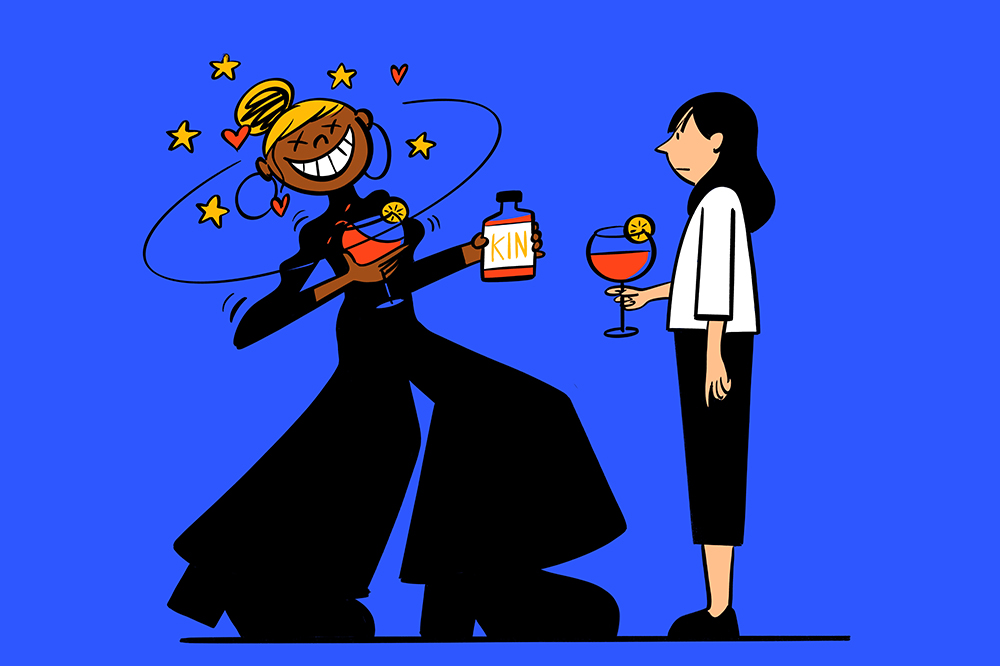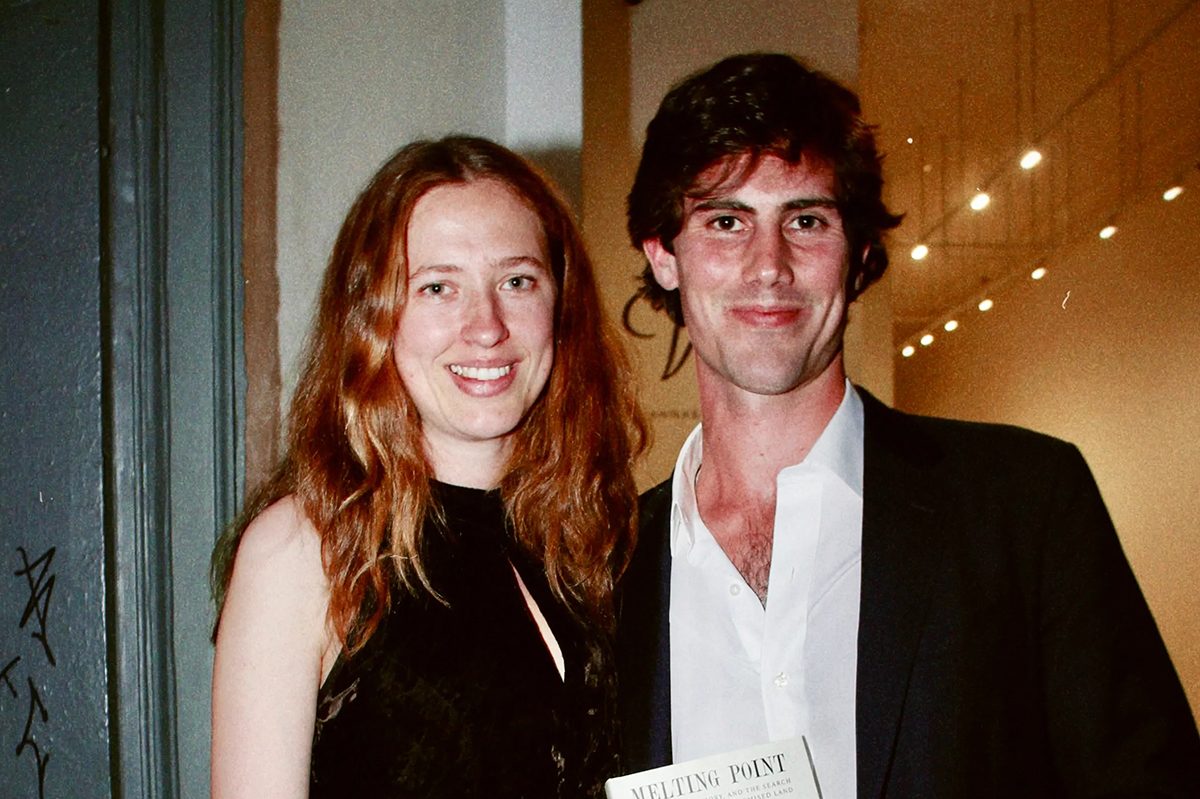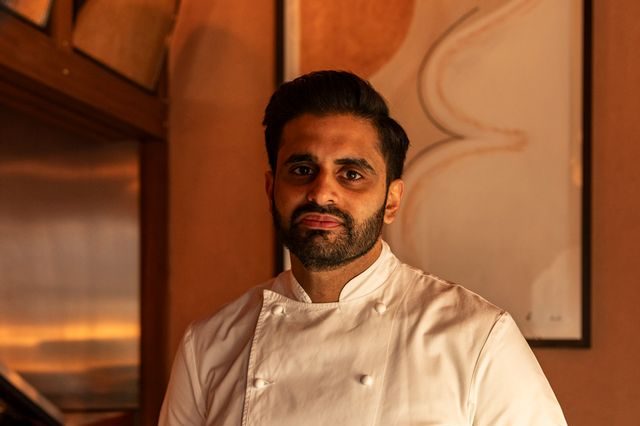This article is in
The Spectator’s inaugural US edition. Subscribe here to get yours.
I met Jen Batchelor at a warehouse space in Brooklyn. She took a square, dark-red leather purse, unclasped it and removed a two-serving mini gold Martini shaker, two ornate cocktail tumblers, specialty bitters and a flask of Kin.
Kin, an alcohol-free cocktail concoction that claims to occasion bliss and give rise to euphoria, is made from nootropics, adaptogens and botanics. It resembles a potion; it is not psychoactive. Its devotees will tell you it reconstructs the ritual of drinking.
When Batchelor — now 34 — was seven, her father worked for an airline and ran a ‘full-fledged English pub’ out of her living room in Saudi Arabia, where alcohol is illegal. A Saudi prince was his number one customer. Batchelor’s formative years were spent without a bathroom, because her father would use it to brew beer, which he served alongside wine and moonshine. ‘I saw an incredible network of people who were bound by this crazy weird experiment,’ Batchelor told me of her childhood home speakeasy, while mixing us two Kin-based drinks with pomegranate and blood orange. ‘To your bliss!’ she said as we clinked glasses. The night before, I’d had something similar at a downtown Manhattan restaurant where the bartender took a blowtorch to a stalk of rosemary and placed it in a turmeric-based Kin cocktail that was delivered on a wooden plank.
Batchelor’s co-founder is Matthew Cauble, whom she met several years ago as he was leaving Soylent, a startup that aimed to suspend the idea of food by replacing it with a chalky, neutral-tasting meal substitute. (Eating is an inefficient use of time.) Cauble lived on the pallid, viscous drink for 60 straight days. ‘People thought you couldn’t touch the idea of food,’ he told me.
After deciding to develop Kin, Cauble and Batchelor spent a year in Seattle practicing their alchemy. ‘The idea was to create a replacement for alcohol. That was the guiding star at the beginning — like how PayPal was going to replace the US dollar,’ Cauble explained, while we sat beneath a wall of live plants in a skylit coffee shop.
Kin tastes how a nondrinker might imagine the flavor of alcohol — an engineered simulacrum of bitterness, like an astringent iteration of the faux-sweet of Diet Coke. The bottles are clear glass and Hendrick’s-shaped, with a wooden twist-cap. They contain 12 servings of Kin. The drink is floral and earthy and looks good in a glass with ice.
I felt nothing. ‘Everyone reacts differently,’ Cauble told me. ‘I feel a tingle, a buzz. I feel more open, more calm. I start talking a lot more. Some people start dancing.’ Batchelor told me that she felt ‘a true sense of lightness’ during and after drinking Kin. ‘The adaptogen plays with whatever your endocrine system is bringing to the table. Maybe your shoulders melt, your legs are heavier — you feel grounded and secure. Versus when I’m drinking wine and not cognizant of myself,’ she said.
Kin has become popular as young Americans veer towards sinless living and self-care. As the brand puts it, ‘self-care doesn’t stop at sunset’. The target market is the so-called ‘detox-retox’ crowd who waver between after-work dry vodka martinis and floods of green juice. ‘But the most healthy thing you can actually do is just, like, not drink,’ says Cauble.
I wondered what sort of demographic Kin might appeal to. ‘Older British men didn’t really get it,’ said Cauble. ‘Younger professional women do — women in New York and LA that work and do things. In a society of overachievers, they value their time more; they can’t give up their mornings. They’re creating, building things.’
The pair asked their friends whether, if there were a theoretical alternative to alcohol, they would consider drinking it. ‘Ten times out of ten, it was a yes,’ explained Batchelor. They also examined their own motivations for creating a new drink. ‘I really follow the 80-20 rule of ayurvedic medicine,’ said Batchelor. ‘I indulge in fries or wine when I need to. But even the 20 percent — why am I doing it? I started begging the question — what is the intention, if there even is one?’ Kin hopes to bring about a reexamination of the rote routine of drinking cocktails.
The science behind Kin is hazy, but the underpinning idea of the drink eclipses its chemistry. ‘I love the placebo effect,’ Cauble told me. ‘I think it’s a fascinating part of society. The doctor who discovered placebo saw it as a positive. He was like, how do we not do this more? Why would we discount the mind’s ability to change its reality?’
As for their methodology, ‘We did a ton of research on the internet,’ Cauble told me. ‘The internet is full of anecdotal evidence, and then we also ran an ad hoc experiment of what balances safety and feeling.’ Kin contains 5-HTP — a chemical precursor to the neurotransmitter serotonin — which is medically discouraged for anyone taking anti-depressants. None of this has been approved by the FDA. For now, they pretty much tell people to drink with caution.
Batchelor and Cauble expressed dismay at the lack of revolution in the universe of cocktails, when much of modern America has been ‘disrupted’ by creativity of some sort in 2019. ‘Why haven’t we innovated on a social situation that’s been around for 6,000 years, when everything else has innovated? We’ve fermented everything under the sun and are still ending up with the same root product: ethanol,’ said Batchelor. And it seemed archaic that ‘doctors and the FDA are still, like, the ordained priests who give us chemicals’. They looked back to the history of drinking. ‘Whether it was the age of Dionysus or Cleopatra, alcohol was a very transcendent experience reserved very specifically for a certain group or ritual,’ said Batchelor.
At Café Clover, in the West Village of Manhattan, Batchelor told me that a pair of women had come in one evening and, after drinking several Kin cocktails, asked the bartender for paper — so that they could sit and draw for the next two hours. Batchelor loves the sketches. ‘All I want to do is pick a hundred creatives all over the country — and the world — and send them a case of Kin and say, like, go and create.’ Kin plans to host salons, book clubs, speakeasies, corporate panels, dance parties — ‘We want to be the go-to for when people are gathering’ — but without the ‘weird spiritual dissonance’ of alcohol that Batchelor remembers from her childhood.
Kin is as much about building a utopia as it is about creating a new drink. ‘My real interest in Kin is what will happen in society when people switch to a new drink, a drink that gives them more time,’ said Cauble. The drink also offers an answer to solitude. ‘I didn’t want to be lonely. I had always felt lonely. I never found a sustainable way to connect. When I had a bottle of Kin I could take places, I felt like I was carrying a social sword.’
I spoke to Larissa May, an entrepreneur and micro-influencer whose nonprofit Half the Story ‘promotes conversation about mental health and social media’. She told me that Kin had completely changed the way that ‘people connect after dark’. She drank Kin and stayed out till 3 a.m. dancing. She told me it was as though she was levitating physically and emotionally. ‘It’s my duty to tell people that there don’t need to be walls around you. I was more like myself than I had ever been. Everything changed when I introduced Kin into my ritual. When you drink, you lose control, but Kin is a feeling of immense bliss and peace.’
This appeals to many entrepreneurs, she said, because ‘you want to wake up and be your best self’. It appeals to entrepreneurs and those in the ‘mental health space who are looking at alternative ways of healing’. They need not be isolated or waylaid by the social emollient of alcohol. ‘Kin creates a space for a ritual of belonging,’ May told me. She brings it with her when she travels. ‘It’s bliss on the run.’
As the beverage’s target audience — a girl in my twenties, living between LA and New York, functional, to the untrained eye — when I tried Kin alone at a bar in the West Village, I felt the same mild pang of anticlimax as when I tried CBD, another pseudo-inebriant rampantly available at coastal health food stores, or when I let my neighbor ‘heal my energy’. My main foray into adaptogens and supplements has been fretting that activated charcoal water would interfere with the effects of the caffeine in my morning coffees. I wasn’t interested in the unknown that could arise from a new, ad hoc slew of neurotransmitters; I didn’t want to disrupt whatever precarious, unknown ecosystem maintains my brain chemistry. After two hours of sitting at the bar reading a script while drinking, the positive effect of Kin was the negative liberty of not being tipsy. It was the bliss of stasis, of not having to transform at all. I kept thinking of the title of Geoff Dyer’s book Yoga for People Who Can’t Be Bothered to Do It. Batchelor and Cauble seem to want to remind drinkers that perhaps the feeling of lightness can, to some extent, be self-induced.
‘Kin on its own is meant to be an interesting idea so people will think about it and discuss it. Kin probably ought to be thought of as more like art than like a prescription drug,’ Cauble explained. ‘The influence of religion in our lives has declined in the past 40 years, so we’re in this time where people are inventing their own rituals, stepping through the phases of what a religion used to do for you.’ Batchelor added: ‘I tell my staff, every night before you go to bed, say a prayer for all the people drinking Kin. I hope everyone is having an easy and safe rise.’
This article is in The Spectator’s inaugural US edition. Subscribe here to get yours.



























